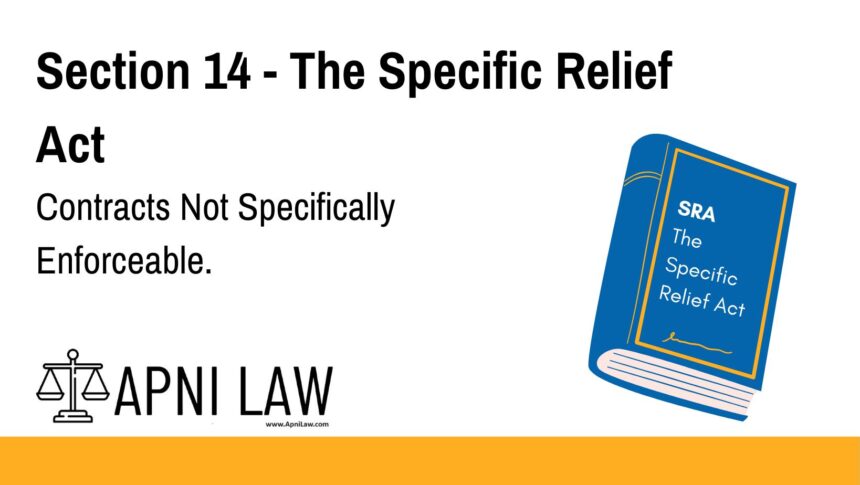Code: Section 14 – The Specific Relief Act
Section 14.
The following contracts cannot be specifically enforced:
(a) Where a party to the contract has obtained substituted performance of the contract under Section 20.
(b) A contract requiring the performance of continuous duties that the court cannot supervise.
(c) A contract dependent on the personal qualifications of the parties, making it impossible for the court to enforce specific performance of its material terms.
(d) A contract that is inherently determinable.
Explanation of Section 14 – The Specific Relief Act
Section 14 of The Specific Relief Act restricts the circumstances under which a court can order specific performance of a contract. Specific performance is a legal remedy where the court orders the breaching party to fulfill their contractual obligations instead of awarding damages. However, this remedy is not suitable for certain contracts.
Key Points:
- Substituted Performance (Section 20):
If one party has arranged for someone else to perform their contractual duties, specific performance cannot be enforced. This ensures that the remedy is not used if a substitute has already been found to fulfill the contract. - Continuous Duty Beyond Court’s Supervision:
Some contracts require ongoing duties that the court is unable to supervise. For example, if a person is hired to perform a continuous service, the court cannot enforce specific performance as it would be impossible to monitor the performance over time. - Dependence on Personal Qualifications:
Contracts based on the personal skills or abilities of the parties involved cannot be specifically enforced. For instance, if a contract requires an artist to paint a portrait, the court cannot compel the artist to perform this task. - Determinable Contracts:
A contract that allows either party to terminate it at will is not subject to specific performance. These contracts are designed to be flexible, and the court will not enforce performance when the contract can be ended by either party.
Illustration
Example 1: Substituted Performance
If a seller arranges for a third party to deliver goods instead of fulfilling the contract themselves, the court cannot order the original contract to be specifically enforced.
Example 2: Continuous Duty Beyond Court Supervision
A person hired to provide ongoing care to an individual cannot be forced by the court to continue performing this service. The court lacks the ability to supervise such personal and continuous duties.
Example 3: Personal Qualifications
An artist is contracted to paint a portrait for a client. Since the contract depends on the artist’s unique skills, the court cannot compel the artist to create the painting, as it involves their personal qualifications.
Example 4: Determinable Contract
A contract that allows either party to terminate it with prior notice cannot be enforced through specific performance, as it is inherently flexible and subject to change.
Common Questions and Answers on Section 14 – The Specific Relief Act
1. What is specific performance?
- Answer: Specific performance is a legal remedy where the court orders a party to fulfill their contractual obligations instead of paying damages.
2. Can a court enforce a contract if a third party has substituted performance?
- Answer: No, if the contract has been substituted under Section 20, specific performance cannot be enforced.
3. Why can’t the court enforce contracts involving continuous duties?
- Answer: These contracts require ongoing performance that the court cannot effectively supervise, making them unsuitable for specific performance.
4. What does it mean if a contract is determinable?
- Answer: A determinable contract is one that either party can end at any time, and as such, it is not subject to specific performance.
5. Why can’t contracts based on personal qualifications be enforced?
- Answer: These contracts depend on the unique abilities of the parties involved. Since the court cannot force someone to perform based on personal skills or attributes, specific performance is not applicable.
Conclusion
Section 14 of The Specific Relief Act identifies contracts that cannot be specifically enforced. These include contracts involving substituted performance, continuous duties beyond court supervision, personal qualifications of the parties, and inherently determinable contracts. The section ensures that specific performance is used only in situations where it is appropriate and feasible.








